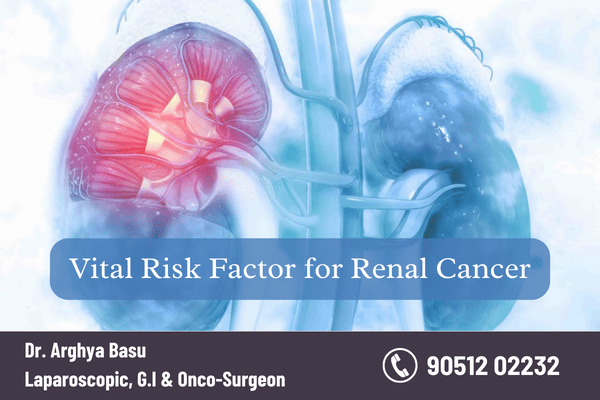Vital Risk Factors for Renal Cancer

Mention the Vital Risk Factor for Renal Cancer
Although kidney cancer can be hereditary, hereditary kidney cancers associated with a single hereditary gene are rare and represent 5% or less of kidney cancers. More than a dozen unique genes that increase kidney cancer risk have been identified, many of which are associated with specific genetic syndromes. Most of these conditions are associated with specific types of kidney cancer (see Introduction). It is important to consult the best cancer surgeon to treat kidney cancer properly.
Finding specific genetic syndromes in a family can help individuals and their doctors develop an appropriate cancer screening program and, in some cases, help determine the best treatment options by the best oncologists appointed for the treatment. Only genetic testing can determine if a person has a genetic mutation.
Most experts strongly recommend that people considering genetic testing first speak to someone with expertise in cancer genetics, such as a genetic counselor, who can explain the risks and benefits of genetic testing.
Genetic diseases and kidney cancer
Some of the genetic conditions that raise the risk of developing kidney cancer include the followings –
Von Hippel-Lindau Syndrome (VHL). Patients with VHL syndrome are at an increased risk of developing several neoplasms. Up to 60% of people with this disease develop definite kidney cancer.
Hereditary papillary renal cell carcinoma (HPRCC). HPRCC is a rare genetic disease that increases the risk of papillary renal cell carcinoma type 1.
People with HPRCC have a very high risk of having more than one kidney tumor on both kidneys, but there is no increased risk of other cancers or diseases.
Birt-Hogg-Dubé syndrome (BHD). BHD syndrome is a rare genetic disorder associated with an increased risk of several noncancerous skin tumors, lung cysts, and noncancerous and cancerous kidney tumors. The tumor is usually a chromophobe, an oncocytoma, or a mixture of the two, called a mixed tumor.
Hereditary leiomyomatosis and renal cell carcinoma Details need to know.
HLRCC is associated with an approximately 16% increased risk of developing a type of kidney cancer similar to papillary or type 2 collecting duct renal cell carcinoma. Legs, chest, and back. HLRCC often causes fibroids of the uterus called leiomyomas. Rarely do adrenal tumors develop.
Tuberous sclerosis syndrome (TSC).
TSC syndrome is a genetic disease associated with skin, brain, kidneys and heart changes. More than half of patients with TSC develop renal angiomyolipoma. About 2% of these people will develop kidney cancer (see fact sheet).
Succinate dehydrogenase complex (SDH) syndrome. SDH is a group of inherited cancer syndromes associated with tumors called pheochromocytomas and paragangliomas.
Gastrointestinal stromal tumors (GIST) and kidney cancer have also been associated with the syndrome.
BAP1 tumor predisposition syndrome (TPS BAP1). Inherited mutations in the BRCA1-associated protein 1 (BAP1) gene are associated with melanoma, mesothelioma, and clear cell RCC of the skin and eyes.
Prevent
Numerous factors can cause various types of cancer. Researchers continue to study the causes of kidney cancer, including ways to prevent it. Although there is no proven way to prevent kidney cancer completely, you can reduce your risk by:
· Quitting smoking
· Lowering blood pressure
· Maintaining a healthy weight
· Consume fruits and vegetables in larger quantities and less fat.
Talk to your healthcare team for more information about your cancer risk.
The next part of this guide is scouting. It explains how the test can detect cancer before signs or symptoms appear.
Use the menu to select a different section to read this guide.
Conclusion
Like many other cancers, the exact cause of kidney cancer is unknown. However, we are unaware that a few things can increase the chances of developing kidney cancer. Advanced age, smoking, obesity, high blood pressure, long-term dialysis, and a family history of kidney cancer increase the risk of kidney cancer.
FAQ –
1. How can you reduce the risk of kidney cancer?
Individuals with a family history of kidney cancer may be at increased risk of getting the disease.
· Prevention
· Quit smoking.
· Lower blood pressure.
· Maintaining a healthy weight.
· Eat more fruits and vegetables and maintain a low-fat diet.